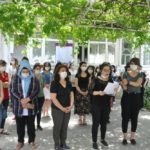The İzmir 2nd High Criminal Court on Friday handed down a jail sentence of 17 years, four months to 82-year-old businessman and philanthropist Yusuf Bekmezci, the state-run Anadolu news agency reported.
Bekmezci suffers from Alzheimer’s and is unable to take care of himself. He also has high blood pressure, sleep apnea, prostate cancer and partial deafness. Despite his serious health problems and advanced age, Bekmezci was tried on charges of terrorism, with the prosecutor demanding a sentence of life in prison.
Speaking to Bold Medya earlier, his daughter Şeyma Bekmezci said her ailing father had been condemned to die in prison.
President Recep Tayyip Erdoğan has been targeting followers of the Gülen movement, a faith-based movement inspired by Turkish Muslim cleric Fethullah Gülen, since the corruption investigations of December 17-25, 2013, which implicated then-Prime Minister Erdoğan, his family members and his inner circle.
Dismissing the investigations as a Gülenist coup and conspiracy against his government, Erdoğan designated the movement as a terrorist organization and began to target its members. He intensified the crackdown on the movement following an abortive putsch that he accused Gülen of masterminding. Gülen and the movement strongly deny involvement in the coup attempt or any terrorist activity.
According to Şeyma Bekmezci, her father could barely understand the court proceedings due to his advanced Alzheimer’s and was unable to defend himself. The lack of proper health care in prison has caused his mental state to deteriorate. “He completely forgets himself in court and is in a vulnerable position,” she said.
Şeyma Bekmezci said a hospital could easily issue a health report saying her father was not fit to be in prison, but the judge did not request one. “If the judge says there’s no need for a report, then he is not taken to the hospital,” she added.
Human rights activists and opposition politicians have frequently criticized authorities for not releasing critically ill prisoners so they can seek proper treatment.
According to a recent report by the Ankara-based Human Rights Association (İHD), there are at least 1,605 ailing inmates in the country’s prisons, 604 of whom are in critical condition. The İHD said it estimates the number of sick inmates to be higher and calls on the government to release them and delay their sentences as the coronavirus pandemic poses a further threat to their medical well-being.
Human rights defender and former Peoples’ Democratic Party (HDP) deputy Ömer Faruk Gergerlioğlu said ill prisoners were not released until they were at the point of no return. He claimed that prisoners did not have access to proper healthcare facilities such as hospitals or infirmaries.
According to a statement from Interior Minister Süleyman Soylu on February 20, a total of 622,646 people have been the subject of investigation and 301,932 have been detained, while 96,000 others have been jailed due to alleged links to the Gülen movement since the failed coup. The minister said there are currently 25,467 people in Turkey’s prisons who were jailed on alleged links to the Gülen movement.
Human Rights Watch says people alleged to have links to the Gülen movement is the largest group targeted by Erdoğan.
Source: Stockholm Center for Freedom (SCF)



